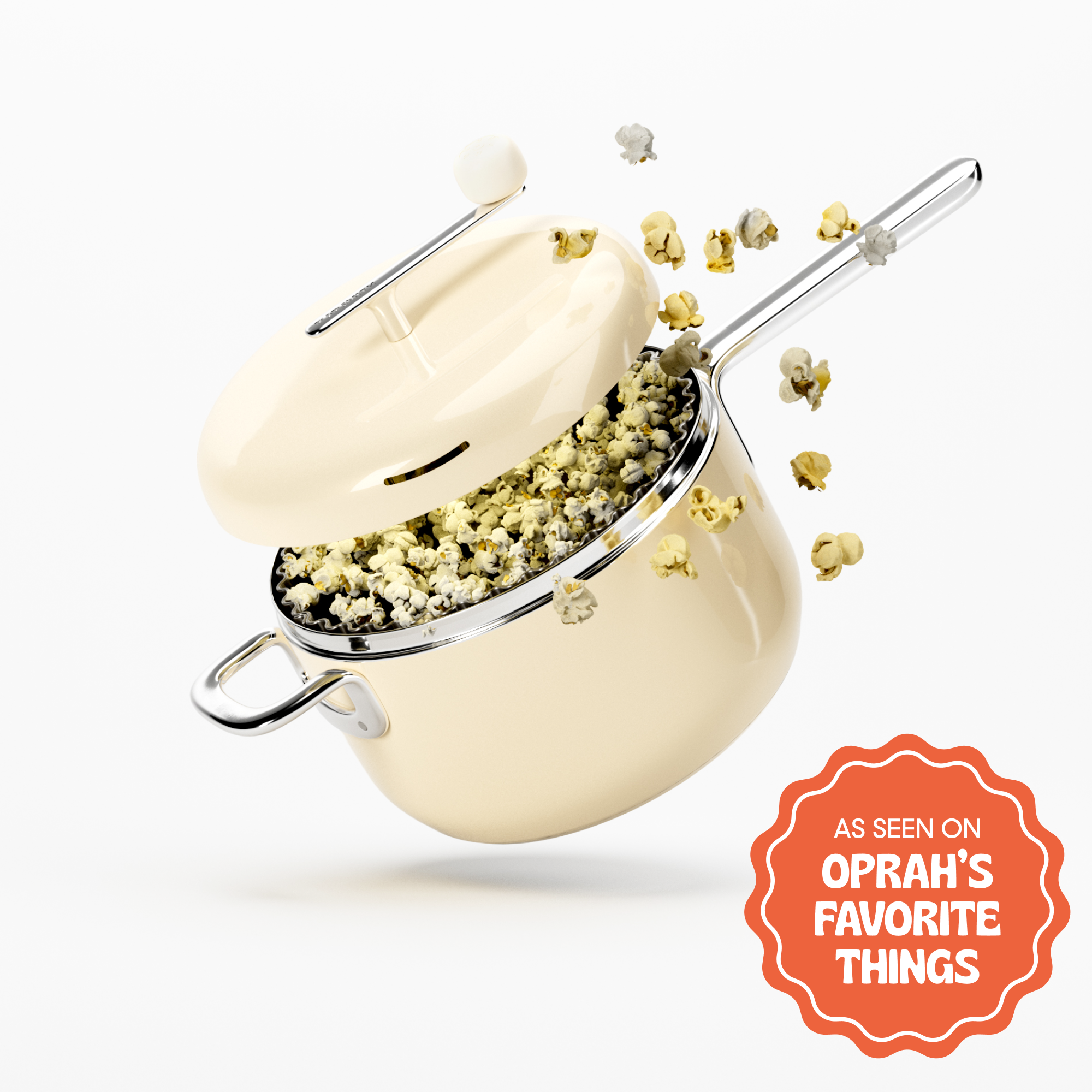If you think popcorn is just popcorn, think again! The kernels you choose can make a real difference in taste and texture. So if the only difference between white vs. yellow popcorn you can name is their color, you better keep reading. There’s so much more to discover.
The Basics of White vs. Yellow Popcorn
Let’s start with the obvious: color.
When yellow kernels pop, they turn into popcorn with a golden tint. White popcorn is, of course, completely white. Some people even call it rice popcorn since it resembles the pearlescent granules.
But the differences don’t stop there:
Key Characteristics of Yellow Popcorn Kernels
-
Sturdy structure: Yellow kernels have a thicker hull. This gives you crunchier popcorn that can hold heavy toppings.
-
Larger size: Yellow popcorn kernels have a medium-to-large size, popping 45 times their size.
-
Richer flavor: It has a more robust corn flavor than white popcorn.
Key Characteristics of White Popcorn Kernels
-
Tender texture: Thanks to its thinner hull, white popcorn tends to be softer than yellow popcorn, giving you a more melt-in-your-mouth experience (and fewer pieces stuck to your teeth).
-
Smaller, denser pieces: White kernels expand 40 times their size when popped.
-
Subtle flavor: White popcorn has a slight sweetness to it. It's nuttier in flavor compared to yellow popcorn.
Which One Should You Choose, White or Yellow Popcorn?
Whether you go for yellow or white popcorn depends on the situation.
Go with yellow popcorn if:
-
You like bigger, crunchier popcorn
-
You’re planning to make buttery movie theater popcorn at home
-
You need popcorn strong enough to hold heavy flavorings like caramel
-
You prefer a stronger corn taste
Reach for white popcorn if:
-
You prefer smaller, more tender pieces
-
You’re looking to avoid getting hulls stuck in your teeth
-
You want a milder flavor that doesn’t overpower delicate toppings
Beyond White and Yellow Popcorn Kernels
While yellow and white kernels are the most common, there’s much more to explore about your favorite snack.
Colorful Popcorn Varieties
Blue popcorn kernels get their blueish tint from antioxidants. They have soft hulls and are more neutral in taste than white popcorn.
Then there’s red popcorn, with its reddish-brown kernels that are sometimes mistaken for pomegranate seeds. When popped, these medium-sized kernels deliver a sweet, nutty taste, and you can still see a bit of red in the hulls.
Popcorn Shapes
Aside from color, popcorn comes in different shapes that affect both texture and how well your snack holds seasonings.
Butterfly popcorn is what most of us imagine when we think of popcorn — those irregular, fluffy pieces with arms jutting out in every direction. The resemblance to butterfly wings and snowflakes is so spot-on that it earned both nicknames, and just like actual snowflakes, each kernel has a unique shape.
Butterfly popcorn’s countless nooks and crannies make it great for catching and holding onto powdered cheese, nutritional yeast, and other dry seasonings.
Meanwhile, mushroom popcorn pops into neat, compact balls peppered with tiny specks and raised dots. This type of popcorn has sturdy, bite-sized spheres that don’t crumble under pressure. It’s the ideal choice for heavier coatings like caramel and chocolate.
Both yellow and white popcorn kernels can pop into either butterfly or mushroom shapes.
How to Get the Perfect Pop Every Time
No matter which type of popcorn you pick, whether it’s yellow or white popcorn, getting the best results boils down to the right tool and techniques. While your Popper does the heavy lifting, you also want to keep these tips in mind:
-
White kernels: Use medium heat and handle gently — they're more delicate and pop at lower temperatures.
-
Yellow kernels: These can tolerate more heat and need extra time to reach their full fluffy potential.
-
Oil choice matters: Choose an oil with a high smoke point. We like coconut oil best because it adds a richness to popcorn.
-
Listen closely: When the pops slow to 1-2 seconds apart, it’s time to take your Popper off the heat and transfer the popcorn into a bowl.
Putting the White vs. Yellow Popcorn Debate to an End
There’s really only one way to figure out whether yellow or white popcorn is better — give both a try!
Even better? Throw a popcorn-tasting party (it’s the perfect excuse to bring out your Popper). Pop some yellow kernels first, then some white, and see which one your guests devour faster. For the best of both worlds, you can always use a blend of the two.
You can even set out a bunch of seasonings and mix-ins to see how they complement the different popcorn kernels.
Want snacking inspiration? Take a look at our blog for classic and unique popcorn recipes! We also share tips for setting up popcorn bars for any occasion.






